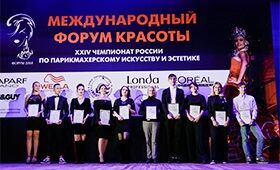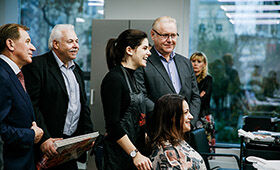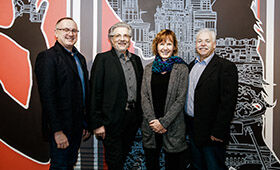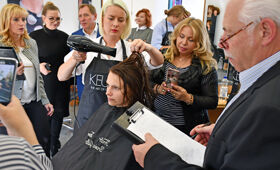German hairdressers and Russian “Parikmacher” receive certificates at the Kremlin
Trainee hairdressers from Germany and Russia were awarded a joint certificate from their national professional associations in a special ceremony hosted at the Kremlin in October. Perhaps we can now visit a “Parikmacher” for our next stylish haircut...

In mid-October, five German trainee hairdressers enjoyed an “amazing opportunity” to show off their skills at a demonstration examination held at the Wella World Studio in Moscow. On 25 October, they joined their fellow Russian apprentices for a special ceremony at the Kremlin Palace, where they all received a certificate for completing the examination in the respective partner country. The award of these certificates, which were signed by the German National Association of Hairdressers (ZV) and the Russian Professional Association of Hairdressers and Beauticians, marked a successful conclusion to the first project to be conducted by GOVET in the field of the craft trades.
The group of young Russian stylists had previously completed a similar simulated final examination under the supervision of a German-Russian examination board during their visit to Germany at the end of September 2018. The demonstration examinations were prepared in detail following extensive networking between expert teams from both countries. Examination requirements in the German journeyman's examination are more extensive. However, Robert Fuhs, Chief Master Craftsman of the Bonn/Rhein-Sieg Hairdressing Guild, was able to draw these up in such a way so as to take account of the more fashion-related working method adopted by his guests. Interestingly enough, the Russian word for hairdresser is “Parikmacher”. This term was originally borrowed from the German term for “wig maker”. Karina Küster, one of the project participants, may therefore feel like the understanding of the craft expresses a particularly artistic approach to the job. Most of the trainees from both countries demonstrated a clear understanding of their trade and achieved a mark of “good” in the examinations.

One of the aims of the project was to gain insights into the comparability of examination and requirements methodologies. Specific differences in this regard were identified in the practical part of the examination. Whereas the German trainees began by conducting a conversation with their client in order to obtain an overall picture of the examination situation and were able to divide up their time in an effective way, it became apparent that there is considerable potential for improvement in the Russian training process, particularly with regard to customer consultation. Experts from both countries were in agreement on this point, whereby the parties cooperated as partners in the realisation of a further main project focus – successful support and consultancy for the development of independent examinations.
Cooperation and successful consultancy

Bilateral exchange meetings focussing on the realignment of the vocational education and training system of the Russian Federation have been taking place since 2013, and training and consultancy services have also been provided within the scope of international VET collaboration. The BMBF-funded VETnet project, which is conducted by the Association of German Chambers of Commerce and Industry (DIHK) in certain pilot regions, has enabled initial experiences to be gathered at the Chambers of Foreign Trade level of independent examinations that are based on the dual system. Meanwhile, at the qualifications level, GOVET has been providing targeted guidance on the logic and mechanisms of examinations to bodies such as the Russian Employers’ Association (via its “National Agency for the Development of Qualifications – NARK”). In 2017, around 50 Russian professional experts received training to familiarise them with the general conditions relating to the respective occupations. The pilot project in the craft trades occupation of hairdressing was initiated at the request of NARK and represents the first milestone of the successful cooperation agreement entered into by Germany and Russia.
Further Russian-German VET cooperation in the craft trades gets off to a good start
Valerie Garelik from the Russian Professional Association of Hairdressers and Beauticians and Harald Esser (ZV) have signed a joint Memorandum of Understanding to express their intent that the cooperation arrangements should continue. Even though the examination framework in the pilot regions does not yet fully comply with the German standard, young Russian stylists are capable of working successfully at a German hairdressing salon if supervised by a master craftsman. The valuable experiences which have emerged from the project are also being directly incorporated into the upcoming development of new terms of reference for further German-Russian VET cooperation projects. This is already a genuine win-win situation.
Dr. Hannelore Kress, GOVET: “The demonstration exam is now a milestone in terms of international cooperation in vocational education and training, leading the way for future projects.”
